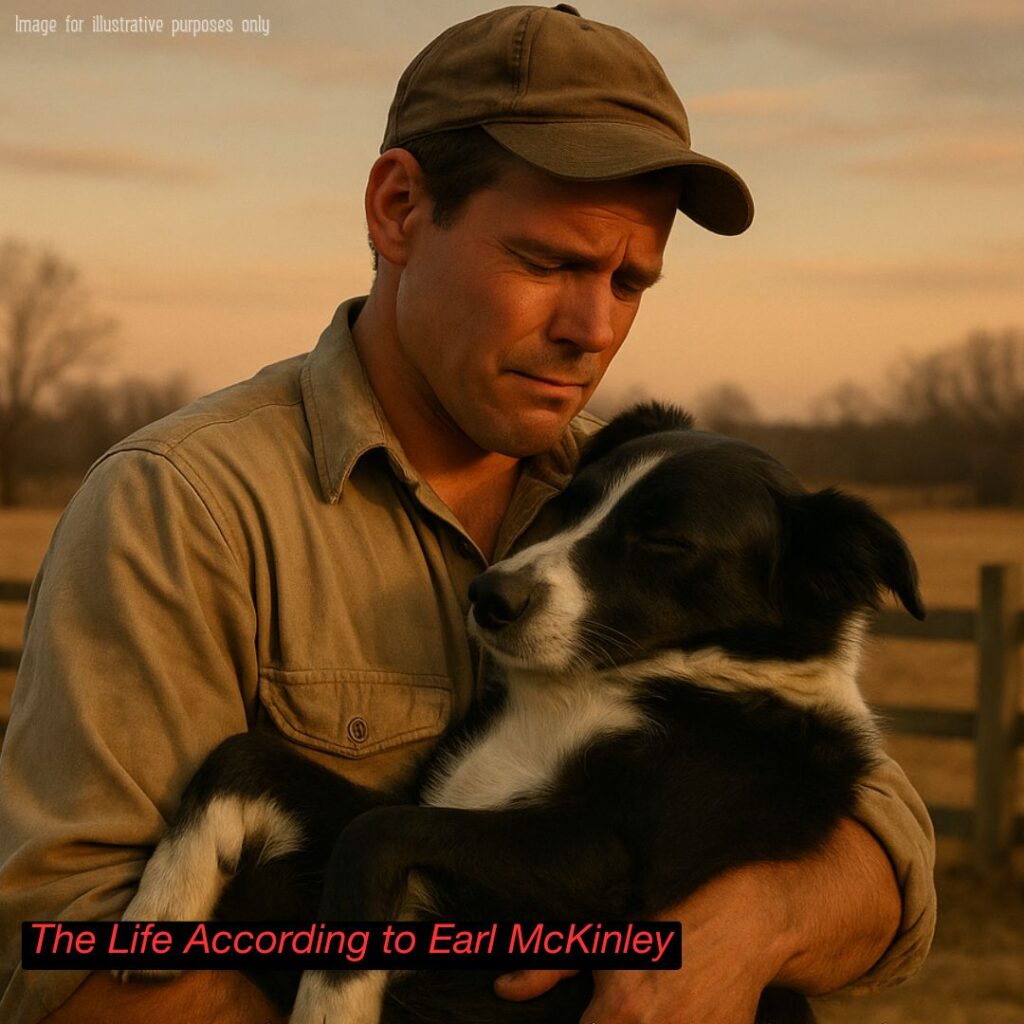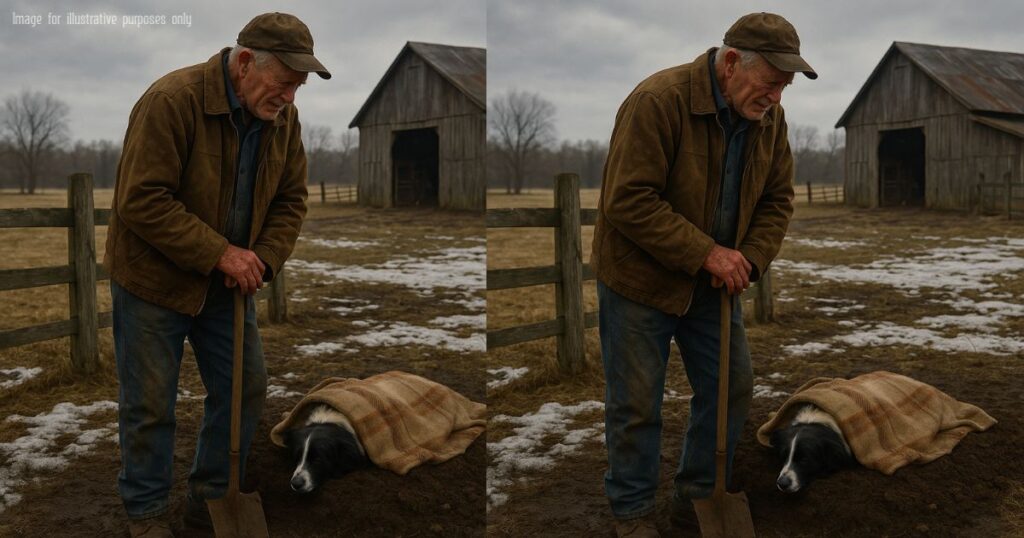Part 2 — Daisy (1965–1977)

They gave him the keys to the farm and a dog with no name. One broke down within a year. The other never did.
The morning he turned eighteen, Earl McKinley woke to the smell of bacon and the silence of absence. His father had already left by the time he came down the stairs, leaving behind only a note scrawled on a grease-stained napkin and a box by the back door.
The note said:
“Keys are in the tractor. Feed bill’s paid through fall. She’s yours now. Take care of the land better than I did. – Dad”
The box barked.
He lifted the lid and saw a blur of black and white fur, a small wet nose, and the wild eyes of something not yet tamed by fences or chores. No ribbon. No instructions. Just a pup with too-big paws and the kind of energy that made your bones tired just watching.
He named her Daisy that night, sitting on the porch swing with a cold beer he wasn’t supposed to have and the weight of inheritance pressing down like summer heat. She chewed the bootlaces off his only decent pair, then curled in his lap and fell asleep like the world made perfect sense.
In those days, the farm was alive in a way it never would be again.
The old barn still stood straight. The fences hadn’t yet bowed from years of frost and wear. Earl had hands unmarked by arthritis, a back unbent by time. And Daisy — well, she was fire and instinct, born to work and wired to follow, though she’d bolt after butterflies just to remind him she was still young.
That first spring, he tried to train her like his father had trained dogs — sharp commands, a switch if needed, lots of barking. But Daisy didn’t answer to fear. She learned from watching. She studied the sheep like a puzzle. By the end of that first season, she moved them smoother than he could — flanking without cue, holding back when lambs panicked, crouching low when it was time to wait.
He’d never seen anything like it.
By the fall of ’66, Earl wasn’t the boy who inherited a farm anymore. He was the man who ran one. Not perfectly, not without mistakes, but with grit. The fields were manageable, the roof held, and he had a partner who never once asked for thanks.
Then came the tornado.
It was late June, the kind of day where the clouds feel too low and the birds vanish from the sky.
He was out fixing a fencepost near the south ridge when he heard it — that freight-train roar, primal and wrong. He ran for the barn, heart hammering, but he’d left the sheep in the west pasture and Daisy somewhere among them.
He screamed her name into the wind.
When he finally stumbled into the cellar barn, soaked and scraped, there she was — muddy, panting, but whole. And behind her, twenty-seven sheep crammed into the low shelter like sardines, wide-eyed but safe. No gates had been closed. No herdsman had driven them. Just her.
She never barked once.
He sat on the dirt floor and cried into her fur, and for the first time since his father left, he didn’t feel like he was alone.
After that, folks started calling her “that miracle dog,” and maybe she was. But she never cared for attention. She slept under the porch, chased rabbits in her dreams, and got twitchy if Earl didn’t let her work by noon.
In ’68, Earl met Carol at the county fair. She wore red lipstick and laughed with her whole mouth, not just the part you show to strangers. Daisy hated her.
“She’s jealous,” Carol teased, after Daisy herded her clear off the porch the third time she visited.
But Daisy learned. By the wedding in spring of ’69, she walked between them down the dirt lane, tail wagging like a flag of surrender. She even let Carol rub her ears, though never without watching Earl out the corner of her eye.
The three of them lived quiet. Honest.
In ’71, Carol miscarried. Earl didn’t know what to say. He spent most of his nights fixing tools that weren’t broken. Daisy laid by the back door, nose pressed to the crack, waiting for someone to open it and bring the world back to normal.
And when they finally did try again — and the boy came, red-faced and angry at being born — Daisy stood guard beside the crib, alert and silent. She never liked the baby much, but she stayed close.
That was her way. Loyalty, not affection. Presence, not show.
In ’75, Daisy started to slow.
It began with stiffness in the mornings, then naps that lasted longer than they used to. Earl told himself it was the heat. Or the ticks. Or the new feed. Anything but time. Anything but the clock he couldn’t stop.
Then one morning, she didn’t come when he called.
He found her lying in the tall grass behind the barn, eyes open but soft, the sheep grazing not far off. She didn’t flinch when he knelt, didn’t move when he stroked her flank. Just blinked once, like she’d been waiting.
She died that night, under the stars and wrapped in the same feed sack that had carried her home as a pup.
Earl buried her by the west fence, same as he would all the others. But she was the first. The one who’d taught him how to listen without speaking. How to show up every day, even when it was hard. Especially when it was hard.
That winter, he carved her name into a cedar plank and nailed it to the post by the gate.
Daisy — 1965–1977
Ran like she had somewhere to be.
Stayed like she knew she was needed.
Years later, after Red, Buck, Millie, and Sadie, Earl would sit in his creaky old chair and tell himself he didn’t play favorites.
But sometimes, when the wind blew just right across the pasture, he could swear he saw her again — young, sharp, beautiful — circling the herd with that sure-footed grace only time could teach.
And he’d whisper, “Good girl,” just in case memory had ears.
🪵
If you remember a dog who made you feel less alone in the world — go ahead and say their name out loud tonight. They’ll hear it.


